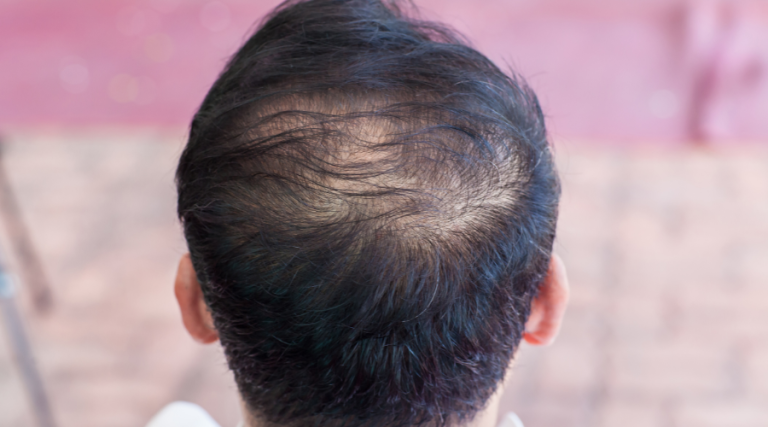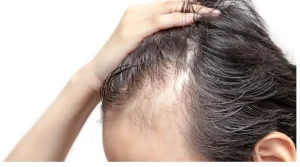Key Takeaway
- Hereditary factors, hormonal imbalances, or underlying health conditions often cause hair loss in men.
- Understanding the root cause is crucial to determining effective solutions, such as medical evaluations, lifestyle changes, or advanced hair restoration techniques, such as transplants.
Hair loss can be a distressing experience, impacting confidence, self-image, and quality of life. Whether you notice thinning at your temples or a widening crown, addressing hair loss with expert guidance can help you regain control and restore your confidence.
Understanding Hair Loss in Men
What Causes Male Hair Loss?
Male hair loss, primarily due to androgenetic alopecia (male pattern baldness), is a hereditary condition triggered by sensitivity to dihydrotestosterone (DHT). However, several other factors can contribute to thinning hair or baldness:
1. Genetics: Family history determines susceptibility to male pattern baldness.
2. Hormonal Imbalances: Fluctuations in male hormones, such as testosterone and its derivatives, can accelerate hair loss.
3. Health Conditions: Disorders like anemia, thyroid disease, or autoimmune conditions can lead to hair thinning.
4. Lifestyle Factors: Common contributors include emotional stress, poor nutrition, and medication side effects.
The Importance of Medical Evaluation
It’s essential to consult a specialist to rule out treatable causes of hair loss. Some conditions linked to hair loss include:
- Anemia: Low iron levels can reduce oxygen supply to hair follicles.
- Thyroid Illness: Both hyperthyroidism and hypothyroidism disrupt hair growth cycles.
- Hormonal Imbalances: Androgen fluctuations affect follicular health.
- Vitamin Deficiencies: A lack of essential nutrients like biotin, zinc, or vitamin D hampers hair growth.
- Autoimmune Disorders: Scarring alopecias can damage hair follicles irreversibly.
Diagnostic Tests for Hair Loss
If you suspect underlying medical conditions, the following tests may be recommended:
- Complete Blood Count (CBC)
- Comprehensive Metabolic Panel (Chem Screen)
- Thyroid Panel (T4, TSH)
- Hormonal Assays (DHEASulfate, testosterone levels)
- Autoimmune Markers (ANA test)
Treatment Options for Hair Loss in Men
Medications
Several FDA-approved medications are effective in slowing or reversing hair loss:
1. Minoxidil (Rogaine): A topical treatment that stimulates follicle activity.
2. Finasteride (Propecia): An oral medication that blocks DHT production.
3. Dutasteride: A stronger alternative to Finasteride for severe cases.
Hair Restoration Procedures
Hair Transplants
Hair transplant surgery relocates healthy follicles from a denser donor area (back and sides of the scalp) to thinning or balding areas. Techniques include:
- FUT (Follicular Unit Transplantation): Involves removing a strip of scalp to harvest follicles.
- FUE (Follicular Unit Extraction): Individual follicles are extracted and transplanted for minimal scarring.
Who Isn’t a Candidate for Hair Transplants?
Not everyone qualifies for hair restoration surgery. Factors include:
- Insufficient Donor Hair: Sparse or weak donor areas may not provide enough viable follicles.
- Advanced Baldness (Norwood Scale): High scores on the Norwood Scale indicate limited success from surgery.
Non-Surgical Alternatives
Platelet-Rich Plasma (PRP) Therapy: Injecting PRP into the scalp stimulates growth by enhancing blood flow and follicular health.
Low-Level Laser Therapy (LLLT): A painless, non-invasive option to promote hair regrowth.
Costs of Hair Restoration
Hair restoration costs depend on the procedure and individual needs. Factors influencing costs include:
1. Surgery Type: FUT is often less expensive than FUE due to the techniques involved.
2. Extent of Hair Loss: Larger balding areas require more grafts, increasing cost.
3. Clinic Location and Expertise: Choose a reputable specialist like Dr. Galope, known for delivering exceptional results.
While these procedures are an investment, the long-term confidence and satisfaction they bring are invaluable.
FAQs About Hair Loss in Men
1. What are male pattern baldness’s early warning signs?
The earliest signs include a receding hairline, thinning at the temples, and a noticeable part widening.
2. How does DHT cause hair loss?
DHT, a derivative of testosterone, binds to hair follicles, shrinking them and shortening their growth phase. Over time, affected follicles stop producing visible hair.
3. Can stress cause hair loss?
Yes, chronic stress triggers telogen effluvium, where more hair enters the shedding phase. Stress management and lifestyle changes can help reverse this condition.
4. Is hair loss reversible?
Reversibility depends on the cause. While genetic hair loss is not fully reversible, medications like Minoxidil or hair restoration techniques can significantly improve appearance.
5. How do I know if I’m a good candidate for a hair transplant?
Candidates need healthy donor areas and realistic expectations. Dr. Galope uses advanced diagnostics like densitometry to assess donor hair viability.
6. Are there risks associated with hair restoration surgery?
As with surgery, risks include infection, scarring, or unsatisfactory results. However, an experienced surgeon like Dr. Galope minimizes these risks with precision and care.
7. How long do hair transplant results last?
Transplanted hair is permanent and resistant to DHT. However, ongoing care, including medications, may be required to maintain non-transplanted hair.
8. What are the alternatives if I’m not a candidate for surgery?
Non-surgical options like PRP therapy, laser treatments, or medications can still provide noticeable improvements.
9. Can diet affect hair health?
A nutrient-rich diet with vitamins A, C, D, E, iron, and biotin supports healthy hair growth.
10. Why choose Dr. Galope for hair restoration?
Dr. Galope is a globally recognized expert in male hair restoration, offering personalized care and advanced techniques tailored to each patient’s needs.
Take the First Step Towards Confidence
Don’t let hair loss define you. You can reclaim your hair and confidence with expert guidance and cutting-edge solutions. Schedule your consultation with Dr. Galope today to explore the best options for your unique situation.





